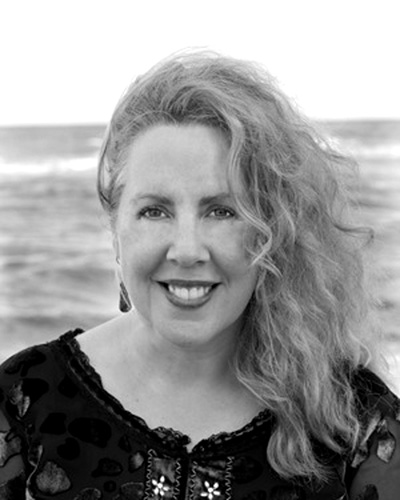One Art
BY PROF. VAROL AKMAN
Denise Duhamel (b. 1961)
I studied for a semester at Trinity College in Wales and read Dylan Thomas. I fell in love with his poems and went to his grave and vowed to him (not that he'd care) that I was going to be a poet, too.
"If you're willing to put two thoughts into a picture then you're already ahead of the game." Sean Penn is Denise Duhamel's favorite actor (she even wrote a poem dedicated to him, entitled "Delta Flight 659"), and this quip of his applies to her poignant verse, too. Invariably, Duhamel's poetry exhibits a number of thoughts, making her one of the most inventive American artists writing today. Grounding her poems in real situations that occur in her life, she's at her best when she chronicles the lives of women, with an insightful blend of present-day pop culture.
 Born on June 13, 1961, in Woonsocket, Rhode Island, Duhamel was educated at Emerson College (BFA, 1984) and Sarah Lawrence College (MFA, 1987). She has been awarded fellowships both in the United States and in Europe. Her poems have been anthologized in six volumes of "The Best American Poetry" (1993, 1994, 1998, 2000, 2010, 2011). Duhamel received a National Endowment for the Arts Fellowship in Poetry in 2001. She is currently an associate professor of English at Florida International University in Miami.
Born on June 13, 1961, in Woonsocket, Rhode Island, Duhamel was educated at Emerson College (BFA, 1984) and Sarah Lawrence College (MFA, 1987). She has been awarded fellowships both in the United States and in Europe. Her poems have been anthologized in six volumes of "The Best American Poetry" (1993, 1994, 1998, 2000, 2010, 2011). Duhamel received a National Endowment for the Arts Fellowship in Poetry in 2001. She is currently an associate professor of English at Florida International University in Miami.
A prolific writer, Duhamel has authored numerous poetry collections, including "Smile!" (1993), "The Woman with Two Vaginas" (1995), "Girl Soldier" (1996), "How the Sky Fell" (1996), "Kinky" (1997), "The Star-Spangled Banner" (1999), "Queen for a Day: Selected and New Poems" (2001), "Mille et un sentiments" (2005), "Two and Two" (2005) and "Ka-Ching!" (2009). Reviewing "Smile!", Edward Field remarked, "More than any other poet I know, Denise Duhamel, for all the witty, polished surface of her poems, communicates the ache of human existence."
This week's piece is from "Queen for a Day" and is printed here courtesy of the poet and University of Pittsburgh Press. I am also thankful to Professor Duhamel for her permission to use the following excerpts from an interview that appeared in miamiartzine.com (March 11, 2009).
> I had severe asthma as a child and spent a lot of time indoors. I spent a long stretch of fourth grade in a children's hospital and I think that is when I really started writing in earnest, to amuse myself and to make sense of what was happening to me.
> My father was a baker -- he finished 8th grade, but then had to quit school to work to help support the family. My mother was a nurse -- she was the Valedictorian of her high school class and got a scholarship to college. The guidance counselor told her she had two choices -- nurse or schoolteacher. This was 1954. My parents weren't exactly thrilled about me becoming a writer. They saw my chance to go to college as a chance to make more money than they did, not as a chance for artistic freedom.
> I didn't discover contemporary poetry until I was a freshman in college. I had studied poetry in high school, but all the poets we read were dead. I thought this meant that all poets were dead, that no one even wrote poetry any more. In 1980, I read a book called "The Jane Poems" by Kathleen Spivack. Soon after I discovered Sharon Olds, and I was hooked.
> Poetry should be thought-provoking without being cliché and (in the case of political poetry) preaching to the choir. I try to achieve that (not sure I always succeed) by implicating the self in my work rather than pointing fingers at others.
Ego
I just didn't get it --
even with the teacher holding an orange (the
earth) in one hand and a lemon (the moon) in the other,
her favorite student (the sun) standing behind her
with a flashlight.
I just couldn't grasp it --
this whole citrus universe, these bumpy planets
revolving so slowly
no one could even see themselves moving.
I used to think if I could only concentrate hard
enough
I could be the one person to feel what no one else
could,
sense a small tug from the ground, a sky shift, the
earth changing gears.
Even though I was only one mini-speck on a speck,
even though I was merely a pinprick in one
goosebump on the orange,
I was sure then I was the most specially perceptive,
perceptively sensitive.
I was sure then my mother was the only mother to snap,
"The world doesn't revolve around you!"
The earth was fragile and mostly water,
just the way the orange was mostly water if you
peeled it,
just the way I was mostly water if you peeled me.
Looking back on that third grade science
demonstration,
I can understand why some people gave up on
fame or religion or cures --
especially people who have an understanding
of the excruciating crawl of the world,
who have a well-developed sense of spatial
reasoning
and the tininess that it is to be one of us.
But not me -- even now I wouldn't mind being god,
the force
who spins the planets the way I spin a globe, a
basketball, a yoyo.
I wouldn't mind being that teacher who chooses
the fruit,
or that favorite kid who gives the moon its glow.